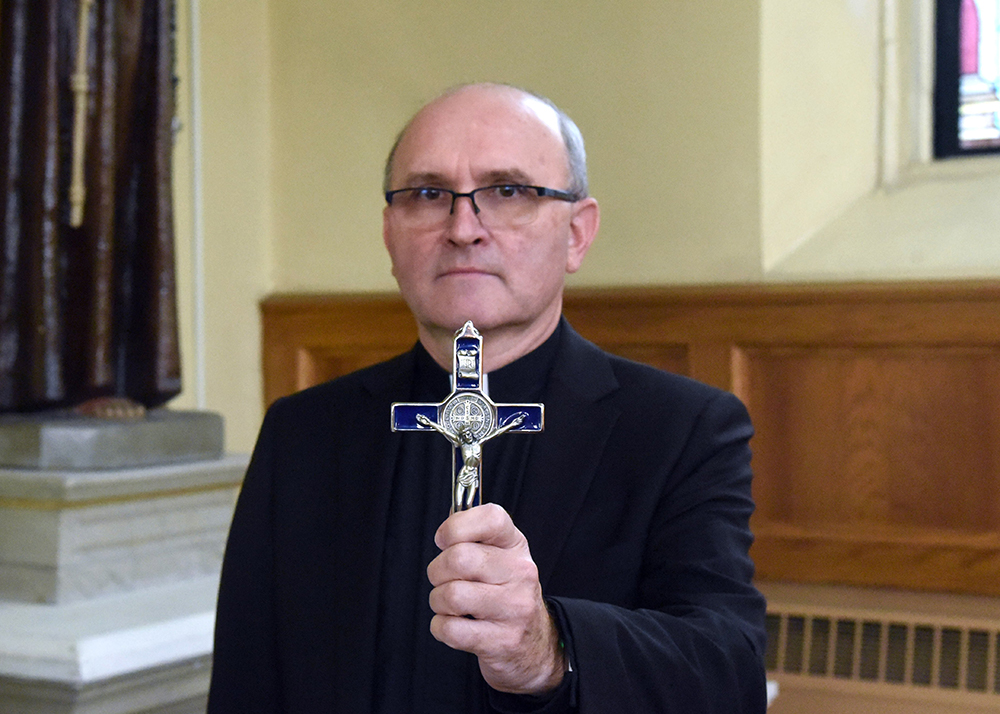
By Gina Christian
(OSV News) — Thinking of having a little “fun” on Halloween by grabbing an Ouija board and ringing up Aunt Edna in the afterlife?
Think again, Catholic experts told OSV News.
“Dangerous, dangerous, dangerous,” said Dominican Father Basil Cole, professor emeritus of moral, spiritual and dogmatic theology at the Dominican House of Studies in Washington.
An Oct. 25 article in the New York Post provided a how-to guide for using a Ouija board, which purports to allow spirits to communicate by spelling out messages with a sliding pointer. First manufactured in the U.S. in 1890 amid surging popular interest in spiritualism, the Ouija board has long been marketed as a toy — yet it’s actually a tool for Satan, said Father Cole.
“Ouija boards and things like that are probably the primary way that people open up the entry point for the demonic into their lives,” said Father Vincent Lampert, exorcist for the Archdiocese of Indianapolis.
The occult also is big business: From 2018 to 2023, industry revenue for psychic services rose 1.5% to $2.3 billion, according to market research firm IBISWorld.
The mainstreaming of magic has even prompted the U.K.-based University of Exeter to begin offering a master of arts degree in magic and occult science. The university also features an interdisciplinary Center for Magic and Esotericism.
Consulting a Ouija board is “obviously an act of superstition,” and the Ouija board is “in fact a portal, an opening to receiving diabolical distortions — false ideas that somehow this board can tell you what the future is or tell you something about yourself,” Father Cole told OSV News.
The so-called “messages” from the board — which some users merely regard as their own subconscious thoughts — prime participants to being “open to receiving more dark inspirations from the evil one,” said Father Cole.
That process takes place “slowly, not immediately,” and “these portals are (therefore) introductions to further incursions of the evil one,” he said.
Father Lampert said while many “turn to a Ouija board because they think it’s kind of harmless … they don’t really understand what they’re putting themselves up against.”
The real-life case of possession that inspired William Peter Blatty’s 1971 book (and 1973 film) “The Exorcist” began with the use of a Ouija board, noted Father Lampert, adding that such items can lead to a “person’s life … (spiraling) downward and out of control” as “the devil shows his true face.”
Along with Ouija boards, tarot cards, fortune tellers and horoscopes also are “problems,” Father Cole warned.
The Catechism of the Catholic Church states that “all forms of divination” — seeking to know the future through supernatural means — are to be rejected.
That includes “recourse to Satan or demons, conjuring up the dead or other practices falsely supposed to ‘unveil’ the future, (and) consulting horoscopes, astrology, palm reading, interpretation of omens and lots, the phenomena of clairvoyance, and recourse to mediums,” the catechism states in No. 2116.
All such practices “conceal a desire for power over time, history, and, in the last analysis, other human beings, as well as a wish to conciliate hidden powers,” it continues. “They contradict the honor, respect and loving fear that we owe to God alone.”
While the human desire for clarity about the future is understandable, divination tools are the wrong method, said Father Cole.
“There’s nothing wrong with wanting to know God’s will,” he said. “I want to know God’s will, of course, but he’s not going to tell me about a lot of things. He will let me discover it. Conversation with God is one thing. Conversation with the evil one is another thing.”
“When people turn to the world of the occult, they’re basically saying that God is deficient, God is not enough,” Father Lampert said. “So I have to turn elsewhere for the answers that I’m looking for.”
Even devotion to the saints can mask a wrong spiritual motive, cautioned Father Cole.
“You can make a devotion to the saints replace a relationship with God — ‘I don’t trust in God anymore, but I do trust in St. Jude. He always gives me what I want.’ … I’ve met people like that, praying to St. Jude and ignoring Mass,” said Father Cole.
But with “true devotion to the saints, you always realize they’re under the Lord Jesus and they want you to do the Lord’s will,” he said.
For those who have dabbled in the occult, there is hope, said Father Lampert.
“When we confess our sins, we place them in the hands of God, and then the devil can no longer use that against us,” he said. “So if somebody has played with a Ouija board, own it, take it to confession, give it over to God and then experience the freedom that God wants all of his children to have.”
Ouija boards and other occult items should be “destroyed so that (they don’t) fall in anyone else’s hands,” Father Lampert said. “The best thing to do is to kind of sprinkle it with holy water … (and) burn it. If people don’t feel comfortable doing that themselves, then they should go and take it to the local parish priest who then can dispose of it.”
God is “always ready to extend his divine mercy” to those who have sinned in any way, including through occult practices, said Father Lampert.
“I like to tell people that what’s unique about Christianity is that it’s not about our search for God, but it’s about God’s search for us,” he said.
